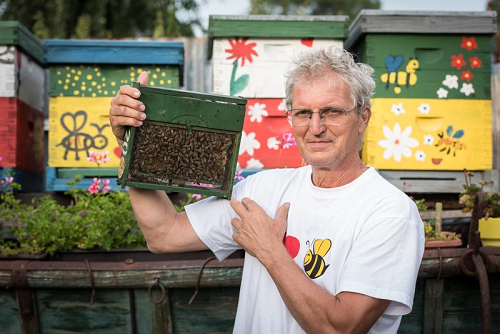Commission takes major step to ban three bee-harming pesticides
Governments must close remaining loopholes
The European Commission has proposed a ban of three neonicotinoid pesticides known to harm bees and other species, except for use in permanent greenhouses, according to a leaked document seen by the Guardian. If such a plan becomes law, the use of Bayer’s imidacloprid and clothianidin, as well as Syngenta’s thiamethoxam will only be allowed in permanent greenhouses “where the crop stays its entire life cycle within the greenhouse and is thus not replanted outside”.

National representatives will vote on the proposal in Brussels at an upcoming meeting scheduled for 17-18 May.
Greenpeace EU food policy director Franziska Achterberg said: “This is great news for bees and the environment. For years, evidence that these chemicals harm bees has been mounting. Now governments must close the remaining greenhouse loophole and eliminate these chemicals once and for all. Healthy pollinator populations are crucial for healthy ecosystems and food production."
“Unfortunately, even if these dangerous pesticides are banned, similar chemicals will still be permitted. The EU must apply the same strict standards to all pesticides and support the transition to ecological methods of pest control,” continued Achterberg.
The latest proposal is based on opinions of the European Food Safety Authority (EFSA) published in 2016. These opinions concur with independent scientific assessments of the dangers associated with neonicotinoid pesticides, such as a 2014 global assessment and a 2015 assessment for Europe, as well as a 2017 review of the most recent scientific evidence, commissioned by Greenpeace. However, EFSA still has not evaluated the safety of spraying these pesticides and using coated seeds in greenhouses.
In its latest opinions, EFSA applied a more comprehensive method of assessing the risks pesticides pose to bees. The European Commission has proposed using this method for all pesticide risk assessments, but national governments still have to agree to this.
The current proposal significantly extends a partial ban of these neonicotinoids instated in 2013.
Source: Greenpeace EU Unit
- 320 reads
Human Rights
Fostering a More Humane World: The 28th Eurasian Economic Summi

Conscience, Hope, and Action: Keys to Global Peace and Sustainability

Ringing FOWPAL’s Peace Bell for the World:Nobel Peace Prize Laureates’ Visions and Actions

Protecting the World’s Cultural Diversity for a Sustainable Future

Puppet Show I International Friendship Day 2020

